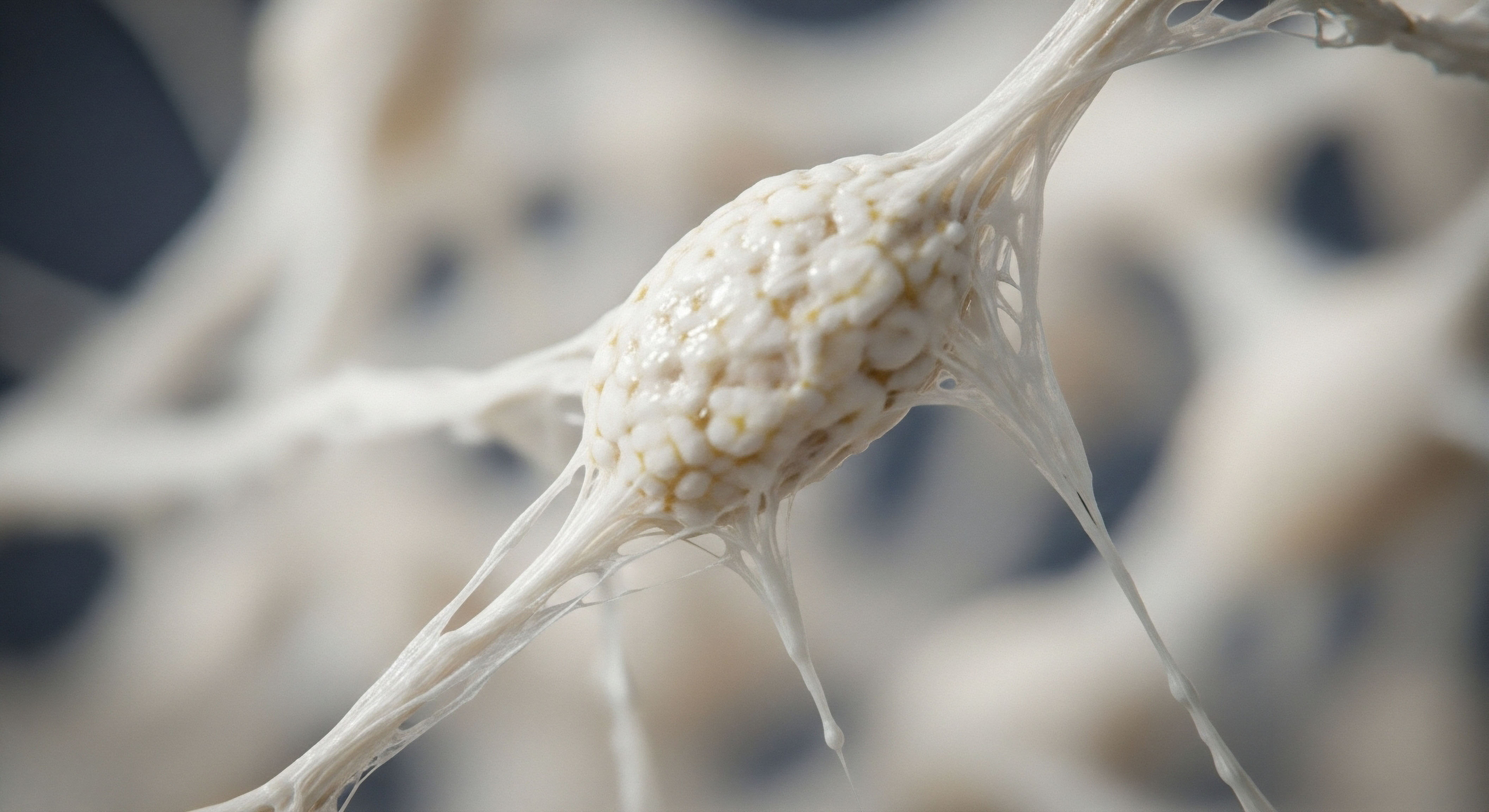

Fundamentals
Perhaps you have experienced moments when your thoughts feel less sharp, or when recalling a name or a fact seems to require an unusual effort. You might find yourself searching for words that once came easily, or notice a subtle shift in your ability to focus on complex tasks.
These experiences, often dismissed as simply “getting older” or attributed to everyday stress, can feel disorienting. They hint at a deeper, systemic change within your biological architecture. Understanding these shifts, particularly how they relate to your hormonal health, represents a powerful step toward reclaiming mental vitality and clarity. Your lived experience of these symptoms is a valid signal from your body, pointing to underlying biological mechanisms that warrant precise attention.
The human body operates as an intricate network of communication systems. Among the most influential of these are your hormones, which function as chemical messengers. These messengers travel throughout your bloodstream, carrying vital instructions to nearly every cell and organ.
They orchestrate a vast array of physiological processes, from regulating your sleep cycles and energy levels to governing your mood and reproductive functions. When these messengers are in balance, your systems operate with remarkable efficiency. When their levels fluctuate outside optimal ranges, the signals become distorted, leading to a cascade of effects that can manifest in various ways, including changes in cognitive function.

The Brain’s Adaptability and Memory Formation
The brain possesses an extraordinary capacity for adaptation, a property known as neuroplasticity. This refers to the brain’s ability to reorganize itself by forming new neural connections throughout life. It allows for learning, memory formation, and recovery from injury. Every new skill acquired, every piece of information retained, and every experience processed reshapes the brain’s physical and functional landscape.
This continuous remodeling is fundamental to cognitive performance and overall mental agility. Memory, a cornerstone of our identity and daily function, relies heavily on this inherent adaptability. It involves complex processes of encoding, storage, and retrieval of information, all facilitated by dynamic changes at the synaptic level.
Memory itself is not a singular entity; it comprises different forms, each supported by distinct brain regions and neural circuits. Episodic memory, for instance, concerns personal experiences and specific events, while semantic memory relates to general knowledge and facts. Working memory involves holding and manipulating information for short periods, essential for problem-solving and reasoning.
The hippocampus, a seahorse-shaped structure deep within the temporal lobe, plays a central role in forming new memories and spatial navigation. Its health and functional integrity are directly tied to your ability to learn and recall.
The brain’s ability to adapt and form memories is deeply influenced by the precise signaling of its internal chemical messengers.

Hormones as Cognitive Orchestrators
Hormones do not merely regulate reproductive cycles or metabolism; they exert profound influence over brain function. They act directly on neurons, affecting their growth, survival, and the strength of their connections. They also modulate the production and activity of neurotransmitters, the brain’s internal signaling molecules. This direct interaction means that optimal hormonal levels are not just desirable for general well-being; they are absolutely essential for maintaining peak cognitive performance, including memory and the brain’s capacity for change.
Consider the Hypothalamic-Pituitary-Gonadal (HPG) axis, a sophisticated feedback system that regulates the production of sex hormones. The hypothalamus, located in the brain, sends signals to the pituitary gland, which then communicates with the gonads (testes in men, ovaries in women). This axis ensures that hormone levels remain within a tightly controlled range.
Disruptions at any point in this axis can lead to imbalances that ripple throughout the body, affecting not only reproductive health but also cognitive processes. Understanding this central regulatory system provides a framework for appreciating how systemic hormonal shifts can impact the brain.
Many individuals experience subtle yet impactful cognitive changes as they age or undergo significant life transitions, such as perimenopause or andropause. These periods are characterized by natural, yet sometimes dramatic, shifts in hormonal output. Recognizing that these cognitive symptoms are often a direct consequence of altered hormonal signaling can shift the perspective from resignation to proactive engagement. It opens avenues for targeted interventions aimed at restoring balance and supporting the brain’s inherent capacity for adaptation.


Intermediate
When hormonal balance deviates from its optimal state, the brain’s intricate communication networks can experience significant disruption. This section explores how specific hormonal imbalances affect brain plasticity and memory, detailing the clinical protocols designed to restore equilibrium and support cognitive function. The goal is to provide a deeper understanding of the therapeutic landscape, explaining the mechanisms by which these interventions can recalibrate your internal systems.

Estrogen’s Influence on Neural Architecture
Estrogen, particularly 17β-estradiol (E2), plays a critical role in maintaining brain health, especially in women. It influences various aspects of neuroplasticity, including the proliferation of neural progenitor cells, the formation of new synaptic connections, and the efficiency of synaptic transmission.
Estrogen receptors are widely distributed throughout brain regions vital for cognition, such as the hippocampus and prefrontal cortex. When estrogen levels decline, as they do during perimenopause and post-menopause, these neuroprotective and neuroplastic effects diminish, contributing to symptoms like brain fog, memory lapses, and reduced mental agility.
Estrogen also impacts brain bioenergetics, enhancing glucose transport and mitochondrial function. This provides the necessary energy for demanding cognitive processes. A reduction in estrogen can therefore lead to an energetic deficit in brain cells, further impairing their ability to function optimally. The decline in estrogen can also affect neurotransmitter systems, including serotonin, which is vital for mood regulation and cognitive processing.

Targeted Estrogen Optimization for Women
For women experiencing symptoms related to estrogen deficiency, personalized hormonal optimization protocols can be highly beneficial. These protocols aim to restore physiological levels of estrogen, often in conjunction with other hormones like progesterone.
- Testosterone Cypionate ∞ While primarily associated with men, low-dose testosterone can be a valuable component of female hormone balance protocols. Typically administered weekly via subcutaneous injection (e.g. 10 ∞ 20 units or 0.1 ∞ 0.2ml), it can support libido, mood, and cognitive clarity, complementing estrogen’s effects on brain function.
- Progesterone ∞ This hormone is prescribed based on menopausal status and plays a significant role in neuroprotection and mood regulation. Progesterone receptors are present throughout the brain, and its metabolites, such as allopregnanolone, can influence neurogenesis and memory. Progesterone helps balance estrogen’s effects and supports neural repair processes.
- Pellet Therapy ∞ Long-acting testosterone pellets offer a consistent delivery method, avoiding daily fluctuations. Anastrozole may be included when appropriate to manage estrogen conversion, ensuring optimal balance.

Testosterone’s Role in Male Cognitive Vitality
Testosterone, the primary male sex hormone, is equally vital for cognitive function in men. Androgen receptors are widely distributed in brain regions critical for memory and learning, including the hippocampus and prefrontal cortex. Testosterone supports neurogenesis, the creation of new neurons, particularly in the hippocampus, and promotes synaptic remodeling. It also exerts neuroprotective effects by modulating neurotransmitter levels and reducing neuroinflammation.
Men experiencing symptoms of low testosterone, such as diminished mental sharpness, difficulty concentrating, or memory issues, often find these challenges significantly impact their daily lives. These cognitive changes are not merely a sign of aging; they can be a direct consequence of suboptimal testosterone levels. Restoring these levels can lead to improvements in spatial memory, verbal fluency, and overall cognitive performance.

Testosterone Replacement Therapy Protocols for Men
Testosterone Replacement Therapy (TRT) protocols for men aim to restore testosterone to a healthy physiological range, thereby mitigating cognitive deficits and supporting overall well-being. A standard protocol often involves weekly intramuscular injections of Testosterone Cypionate (200mg/ml).
To maintain the delicate balance of the endocrine system and mitigate potential side effects, TRT protocols often include additional medications ∞
- Gonadorelin ∞ Administered via subcutaneous injections, typically twice weekly, Gonadorelin helps maintain natural testosterone production and fertility by stimulating the pituitary gland to release luteinizing hormone (LH) and follicle-stimulating hormone (FSH).
- Anastrozole ∞ This oral tablet, taken twice weekly, acts as an aromatase inhibitor, blocking the conversion of testosterone to estrogen. This helps prevent estrogen-related side effects, such as gynecomastia or water retention, which can also impact mood and cognitive clarity.
- Enclomiphene ∞ In some cases, Enclomiphene may be included to further support LH and FSH levels, particularly for men concerned with maintaining endogenous testosterone production or fertility.
Precise hormonal optimization, including testosterone and estrogen protocols, can significantly enhance brain function and cognitive resilience.

Thyroid Hormones and Brain Function
Thyroid hormones, specifically triiodothyronine (T3) and thyroxine (T4), are fundamental for brain development and ongoing function throughout life. They influence neurogenesis, neuronal and glial cell differentiation, migration, synaptogenesis, and myelination. The brain, particularly the hippocampus and cerebral cortex, contains numerous thyroid hormone receptors, underscoring their importance for cognitive processes.
Imbalances in thyroid hormone levels, whether too low (hypothyroidism) or too high (hyperthyroidism), can significantly impair cognitive function. Hypothyroidism often presents with symptoms such as memory loss, attention deficits, and slower cognitive processing. It can lead to decreased hippocampal neurogenesis and compromised synaptic plasticity. Hyperthyroidism, while less common in its cognitive presentation, can also cause nervousness, agitation, and difficulty focusing. Proper thyroid function is therefore a prerequisite for optimal brain plasticity and memory.

Cortisol and the Stress Response
Cortisol, often called the “stress hormone,” is produced by the adrenal glands as part of the body’s stress response. While acute, short-term increases in cortisol can sometimes enhance memory consolidation for emotionally salient events, chronic elevation of cortisol has detrimental effects on the brain.
Sustained high levels of cortisol can impair synaptic plasticity and lead to a reduction in the size of the hippocampus, a region critical for memory formation. This can manifest as forgetfulness, difficulty learning new information, and impaired emotional regulation.
The interplay between cortisol and other hormones is complex. Chronic stress, leading to elevated cortisol, can disrupt the delicate balance of the HPG axis, further exacerbating hormonal imbalances that affect cognitive health. Managing stress through lifestyle interventions and, when necessary, targeted support, becomes an integral part of a comprehensive wellness protocol aimed at preserving brain function.

Growth Hormone Peptides for Cognitive Enhancement
Growth hormone-releasing peptides (GHRPs) represent a sophisticated class of therapeutic agents that stimulate the natural release of human growth hormone (HGH) from the pituitary gland. Unlike synthetic HGH injections, GHRPs encourage the body’s own production, offering a more physiological approach to supporting vitality and cognitive function. These peptides are gaining recognition for their potential in anti-aging, muscle gain, fat loss, and significant improvements in sleep quality.
The benefits of GHRP therapy extend directly to brain health. They can reduce brain fog, improve focus, and support emotional well-being. HGH and its downstream mediator, Insulin-like Growth Factor-1 (IGF-1), are known to enhance neurogenesis and vasculogenesis within the central nervous system. This means they can promote the formation of new neurons and improve blood supply to brain tissue, both critical for brain plasticity and memory.
Key peptides in this category include ∞
| Peptide Name | Mechanism of Action | Cognitive Benefits |
|---|---|---|
| Sermorelin | Stimulates natural HGH release from the pituitary. | Improved mental clarity, enhanced memory, better sleep quality. |
| Ipamorelin / CJC-1295 | Synergistic action to increase HGH pulsatility and duration. | Reduced brain fog, improved focus, neuroprotection. |
| Tesamorelin | Specifically targets visceral fat reduction, with cognitive benefits. | Improved verbal memory, enhanced executive function. |
| Hexarelin | Potent HGH secretagogue, also with cardioprotective effects. | Supports neurogenesis, potential for cognitive recovery. |
| MK-677 (Ibutamoren) | Oral HGH secretagogue, increases HGH and IGF-1 levels. | Enhanced sleep, improved memory, potential for neuroprotection. |
Other targeted peptides, such as PT-141 for sexual health, can indirectly support cognitive well-being by addressing related aspects of vitality. Pentadeca Arginate (PDA), designed for tissue repair and inflammation reduction, contributes to overall systemic health, which in turn supports a healthy brain environment. These protocols represent a sophisticated approach to optimizing biological systems for enhanced cognitive function and overall longevity.


Academic
A deeper exploration into how hormonal imbalances affect brain plasticity and memory requires an understanding of the intricate molecular and cellular mechanisms at play. The brain is not merely a passive recipient of hormonal signals; it actively responds and adapts through complex biochemical pathways. This section analyzes the neuroendocrinological underpinnings of cognitive function, drawing from advanced research to illustrate the profound interconnectedness of the endocrine system with neural health.

Steroid Hormone Receptor Dynamics in Neural Tissue
Steroid hormones, including estrogens, androgens, and glucocorticoids, exert their effects by binding to specific receptor proteins located within target cells. These receptors are found in abundance in various brain regions, particularly those associated with learning and memory, such as the hippocampus, prefrontal cortex, and amygdala.
Upon binding, the hormone-receptor complex translocates to the cell nucleus, where it acts as a transcription factor, regulating the expression of specific genes. This genomic mechanism leads to changes in protein synthesis, ultimately altering neuronal structure and function.
Beyond genomic actions, steroid hormones also engage in rapid, non-genomic signaling. These actions occur at the cell membrane or in the cytoplasm, activating intracellular signaling cascades, such as the MAPK/ERK and PI3K-AKT pathways. These rapid signaling events can quickly modulate neuronal excitability, synaptic transmission, and dendritic spine density, contributing to immediate changes in synaptic plasticity.
The dual nature of steroid hormone action ∞ both slow genomic and rapid non-genomic ∞ allows for a sophisticated and responsive modulation of neural circuits.

Estrogen’s Molecular Footprint on Synaptic Plasticity
Estrogen’s influence on brain plasticity is particularly well-documented at the molecular level. It enhances synaptogenesis, the formation of new synapses, and increases the density of dendritic spines, which are small protrusions on dendrites that receive synaptic input. These structural changes are directly correlated with improved learning and memory.
Estrogen also modulates the activity of N-methyl-D-aspartate receptors (NMDARs), which are critical for long-term potentiation (LTP), a cellular mechanism underlying learning and memory. By increasing the expression and function of NMDARs, estrogen facilitates the strengthening of synaptic connections.
Furthermore, estrogen supports neuronal bioenergetics by increasing mitochondrial function and ATP production. This is vital for the high metabolic demands of active neurons and for processes like neurogenesis and synaptic remodeling. A decline in estrogen can therefore lead to mitochondrial dysfunction, contributing to neuronal vulnerability and cognitive decline. The hormone also influences the expression of neurotrophic factors, such as Brain-Derived Neurotrophic Factor (BDNF), which promotes neuronal survival, growth, and synaptic plasticity.
Hormonal actions at the cellular level orchestrate the brain’s capacity for learning and memory.

Androgen’s Neurogenic and Neuroprotective Pathways
Testosterone and its metabolites, including dihydrotestosterone (DHT) and estradiol (via aromatization), exert significant effects on adult neurogenesis. Research indicates that androgens primarily enhance the survival of newly generated neurons in the dentate gyrus of the hippocampus. This process is mediated through androgen receptors (ARs) expressed on neurons and glial cells. While direct action on new neurons is a possibility, indirect pathways involving neurotrophic factors like BDNF are also implicated.
Testosterone also provides neuroprotection by inhibiting oxidative stress and reducing the formation of amyloid-beta (Aβ) peptides, which are implicated in neurodegenerative conditions. It supports myelin repair and axon regeneration, crucial for maintaining neural network integrity and efficient signal transmission. The presence of ARs on axons and dendrites suggests both genomic and non-genomic signaling pathways contribute to testosterone’s neuroprotective and neurogenic effects.

Thyroid Hormone Receptor Isoforms and Neural Stem Cell Fate
The precise actions of thyroid hormones in the adult brain are mediated by nuclear receptors, primarily Thyroid Hormone Receptors (TRs), specifically TRα1, TRβ1, and TRβ2 isoforms. These receptors regulate gene expression critical for neural stem cell function in neurogenic niches like the subgranular zone (SGZ) of the hippocampus and the subventricular zone (SVZ).
T3, the active form of thyroid hormone, plays a critical role in the commitment of neural stem cells toward a neuronal phenotype and their subsequent differentiation and integration into existing neural networks.
Hypothyroidism disrupts hippocampal neurogenesis, affecting the terminal differentiation of neuroblasts and their functional integration. This mechanistic understanding explains the cognitive deficits, including impaired learning and memory, observed in individuals with thyroid dysfunction. The balance between liganded (bound to T3) and unliganded TRα1 is particularly important, as an excess of unliganded receptors, characteristic of hypothyroidism, can lead to adverse effects on adult progenitor development.

Glucocorticoid Receptor Signaling and Hippocampal Vulnerability
Cortisol, a glucocorticoid, exerts its effects through glucocorticoid receptors (GRs) and mineralocorticoid receptors (MRs), which are highly expressed in the hippocampus. While MRs are activated by low, basal levels of cortisol and support neuronal excitability and plasticity, GRs are activated by higher, stress-induced levels.
Chronic activation of GRs can impair synaptic plasticity, particularly long-term potentiation (LTP), and reduce neurogenesis in the hippocampus. This can lead to hippocampal atrophy and contribute to memory impairment and increased susceptibility to neurodegenerative processes.
The complex relationship between cortisol and memory is dose-dependent and context-specific. Moderate, acute increases in cortisol can enhance memory consolidation for emotionally arousing events by increasing functional connectivity within hippocampal subregions. However, prolonged exposure to elevated cortisol levels shifts this balance towards neurotoxicity, increasing vulnerability to oxidative stress and inflammation within the brain. This highlights the importance of precise regulation of the stress response for maintaining cognitive resilience.

Peptide Modulators of Neurogenesis and Synaptic Function
Growth hormone-releasing peptides (GHRPs) and other targeted peptides operate through distinct mechanisms to influence brain plasticity. GHRPs, such as Sermorelin and Ipamorelin, stimulate the release of endogenous growth hormone (GH) from the pituitary. GH, in turn, acts directly on brain cells via GH receptors and indirectly through the production of IGF-1.
Both GH and IGF-1 are potent neurotrophic factors, promoting neurogenesis, neuronal survival, and synaptic plasticity. They enhance the expression of presynaptic markers like synapsin-1 and myelin basic protein, supporting synaptic integrity and myelination.
The neuroprotective effects of these peptides extend to reducing neuroinflammation and oxidative stress, thereby creating a more favorable environment for neuronal health. For instance, GH and GHRP-6 have been shown to increase levels of anti-apoptotic proteins like Bcl-2 in brain regions such as the hypothalamus, hippocampus, and cerebellum.
This contributes to neuronal survival and resilience against various insults. The precise targeting of specific receptors and signaling pathways by these peptides offers a sophisticated avenue for supporting cognitive function and mitigating age-related cognitive decline.
| Hormone Category | Primary Mechanism on Brain Plasticity | Impact on Memory |
|---|---|---|
| Estrogens | Enhances synaptogenesis, dendritic spine density, NMDAR function, mitochondrial bioenergetics. | Supports encoding, consolidation, and retrieval of complex associative memories. |
| Androgens | Promotes neurogenesis (new neuron survival), modulates neurotransmitter levels, reduces neuroinflammation. | Enhances spatial memory, verbal fluency, and overall cognitive performance. |
| Thyroid Hormones | Regulates neural stem cell differentiation, synaptogenesis, myelination. | Essential for learning, memory formation, and cognitive processing speed. |
| Glucocorticoids (Cortisol) | Acute ∞ enhances functional connectivity; Chronic ∞ impairs synaptic plasticity, reduces neurogenesis. | Acute ∞ strengthens emotional memory; Chronic ∞ leads to memory impairment, hippocampal atrophy. |
| Growth Hormone Peptides | Stimulates neurogenesis, vasculogenesis, increases neurotrophic factors (BDNF, IGF-1), reduces neuroinflammation. | Improves mental clarity, focus, learning, and overall cognitive resilience. |
| Progesterone | Neuroprotective, influences BDNF, modulates GABAergic system, supports neural repair. | Contributes to memory consolidation, reduces cognitive deficits, particularly post-injury. |
The intricate dance of these biochemical messengers underscores the complexity of brain health. Each hormone, through its specific receptor interactions and downstream signaling cascades, contributes to the dynamic processes that underpin brain plasticity and memory. Understanding these deep biological considerations provides a robust foundation for developing personalized wellness protocols that truly address the root causes of cognitive concerns.

References
- Aripkhodjaeva, Shakhzoda, and Zulaykho Shamansurova. “The interplay of hormones and neuroplasticity ∞ how hormonal changes shape brain adaptation to stress and learning.” Endocrine Abstracts, vol. 110, 2025.
- Bernal, Juan. “Mechanisms of Thyroid Hormone Action on Adult Neurogenesis.” Thyroid and Brain ∞ Understanding the Actions of Thyroid Hormones in Brain Development and Function, vol. 1, 2024, pp. 258.
- Brinton, Roberta Diaz. “Estrogen-induced plasticity from cells to circuits ∞ predictions for cognitive function.” Trends in Neurosciences, vol. 34, no. 4, 2011, pp. 178-187.
- Goldfarb, Elizabeth V. et al. “Hippocampal Mechanisms Support Cortisol-Induced Memory Enhancements.” Journal of Neuroscience, vol. 43, no. 43, 2023, pp. 7268-7281.
- Galea, Liisa A.M. et al. “Neuroplasticity, Hormones, and Cognition.” My Site, 2024.
- Hamson, David K. et al. “Testosterone and Adult Neurogenesis.” Brain Sciences, vol. 10, no. 2, 2020, pp. 88.
- Martin, Angela. “Thyroid Hormones and their Influence on Neuroplasticity and Cognitive Function.” Journal of Clinical Endocrinology and Metabolism, vol. 109, no. 7, 2024, pp. 2100-2110.
- Moraes, Maria Fernanda, et al. “Neuroprotective ∞ Neurorestorative Effects Induced by Progesterone on Global Cerebral Ischemia ∞ A Narrative Review.” MDPI, vol. 13, no. 12, 2023, pp. 1876.
- Nilsen, Jan E. and Roberta Diaz Brinton. “Progesterone and neuroprotection.” Bohrium, 2010.
- Paredes, Ruben G. and Laura L. Hernandez. “Testosterone and brain aging.” MedCrave online, vol. 10, no. 1, 2025, pp. 1-6.
- Pascual-Leone, Alvaro, et al. “Understanding the Intersection Between Hormonal Dynamics and Brain Plasticity in Alzheimer’s Disease ∞ A Narrative Review for Implementing New Therapeutic Strategies.” PMC, 2025.
- Rao, M. Lakshmi, et al. “Hormonal Influences on Cognitive Function.” PMC, 2022.
- Schumacher, Michael, et al. “Progesterone in the Brain ∞ Hormone, Neurosteroid and Neuroprotectant.” International Journal of Molecular Sciences, vol. 23, no. 23, 2022, pp. 14920.
- Shughrue, Pamela J. and Istvan Merchenthaler. “Estrogen Receptors and Their Distribution in the Brain.” Frontiers in Neuroendocrinology, vol. 21, no. 1, 2000, pp. 1-21.
- Soh, S. H. et al. “Effects of androgen replacement therapy on cognitive function in patients with hypogonadism ∞ A systematic review and meta‑analysis.” Experimental and Therapeutic Medicine, vol. 29, no. 5, 2025, pp. 305.
- Yagi, Shingo, et al. “Androgens Enhance Adult Hippocampal Neurogenesis in Males but Not Females in an Age-Dependent Manner.” Oxford Academic, vol. 38, no. 1, 2017, pp. 13-24.

Reflection
Having explored the intricate connections between your hormonal landscape and the remarkable capabilities of your brain, you now possess a deeper understanding of how these internal systems influence your mental sharpness and memory. This knowledge is not merely academic; it is a powerful lens through which to view your own health journey.
The subtle shifts you experience, the moments of cognitive haze, or the challenges with recall are not isolated incidents. They are often signals from a finely tuned biological system seeking balance.
Consider this exploration a foundational step. The path to reclaiming vitality and optimal cognitive function is deeply personal, reflecting your unique biological blueprint. It involves listening to your body’s signals, understanding the underlying mechanisms, and engaging with precise, evidence-based strategies.
This journey requires a partnership with knowledgeable clinical guidance, allowing for the careful assessment of your individual hormonal status and the development of protocols tailored specifically to your needs. Your capacity for health and mental clarity is an inherent part of your being, waiting to be fully realized through informed and compassionate care.



